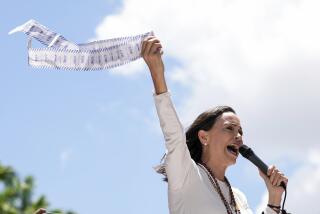Venezuela to hold presidential election in April
CARACAS, Venezuela — A special election to decide the late Venezuelan President Hugo Chavez’s successor will be held in April, with Chavez’s handpicked successor, interim President Nicolas Maduro, to face an opponent or opponents from the opposition.
Maduro, 50, was sworn in as “president in charge” Friday night, three days after Chavez, 58, died at a Caracas military hospital of complications from cancer. A former bus driver and union leader, Maduro served under Chavez as foreign minister and vice president. He is the ruling party’s standard-bearer in the April 14 vote, which falls beyond a constitutionally mandated 30-day limit for a presidential election after an incumbent’s death or resignation.
Maduro’s potential opponents have little time to decide whether to run. National Electoral Council leader Tibisay Lucena said in a televised news conference that all candidates must declare themselves no later than Monday.
Ramon Guillermo Aveledo, spokesman for the Democratic Unity coalition of opposition parties, said immediately after Lucena’s announcement that it would forward Miranda state Gov. Henrique Capriles as the sole candidate to face Maduro. As the Unity candidate in October, Capriles lost to Chavez, 55% to 45%.
Saturday afternoon, Capriles said in a Twitter message that he had not decided whether to accept the nomination.
A Capriles spokesman later said the governor would announce his decision on Sunday.
No matter the opponent, Maduro is a heavy favorite to win the election as the beneficiary of the Chavez legacy and of the enormous outpouring of sympathy since the socialist leader’s death. Moreover, the opposition is still smarting from the October presidential election loss and an even more overwhelming defeat in gubernatorial elections in December.
Maduro named Science and Technology Minister Jorge Arreaza, who is married to Chavez’s daughter, Rosa Virginia, as his vice president and running mate, a move that capitalizes on Chavez’s political legacy, observers said.
“The brevity of the campaign will benefit Maduro,” said political science professor Jose Vicente Carrasquero of Simon Bolivar University in Caracas, the capital. “The opposition is coming from two electoral processes in which Chavismo won handily. This has generated desperation and less motivation [by anti-Chavistas] to vote.”
Still, an opposition candidate could hammer away at the Chavez government’s poor economic performance. Inflation may reach 30% this year, scarcity of basic household goods is acute, and a recent devaluation will hit poor voters hardest. Venezuela’s violent crime rate is among the highest in the world.
“The government Maduro is inheriting is at the brink of a crisis, a fact totally obscured by the death of President Chavez,” Carrasquero said.
The opposition’s strategy must be to bring Maduro “down to earth,” said pollster Luis Vicente Leon, and separate him in the public’s mind from Chavez. “The opposition’s only hope is to be creative.”
“Even if Maduro is not a charismatic leader, his naming by Chavez as his political heir is a powerful endorsement that will make him the favorite,” Leon said. “But as we know from history, favorites don’t always win.”
Kraul and Mogollon are special correspondents.
More to Read
Sign up for Essential California
The most important California stories and recommendations in your inbox every morning.
You may occasionally receive promotional content from the Los Angeles Times.










